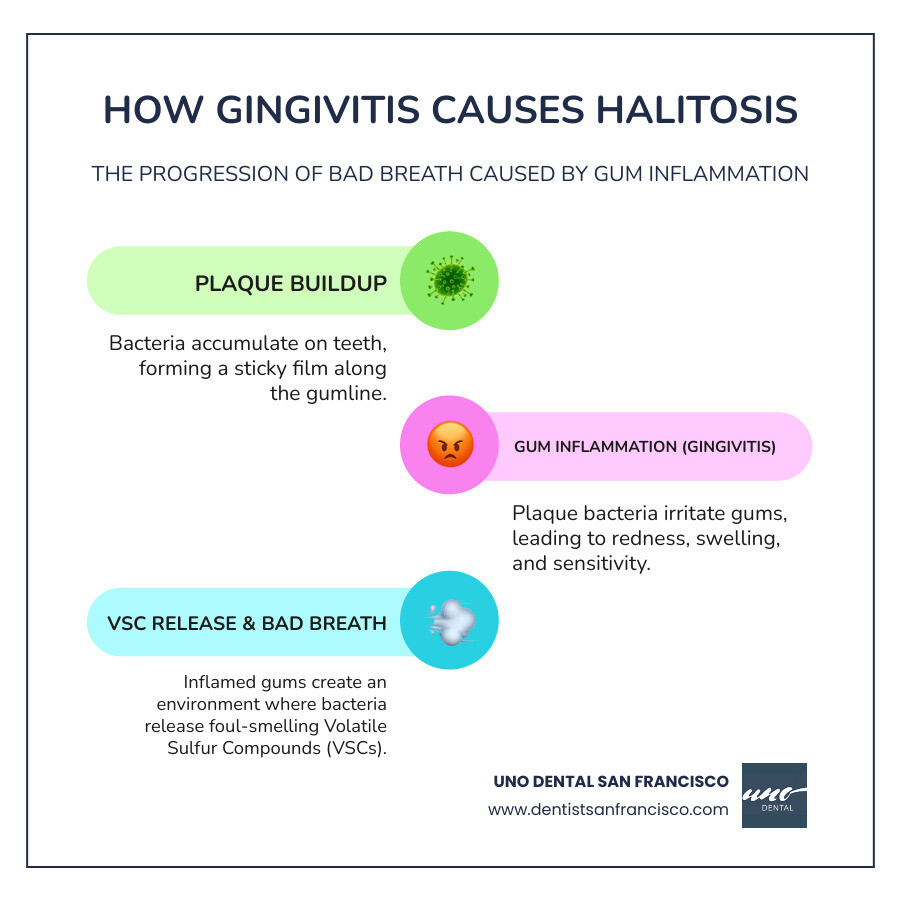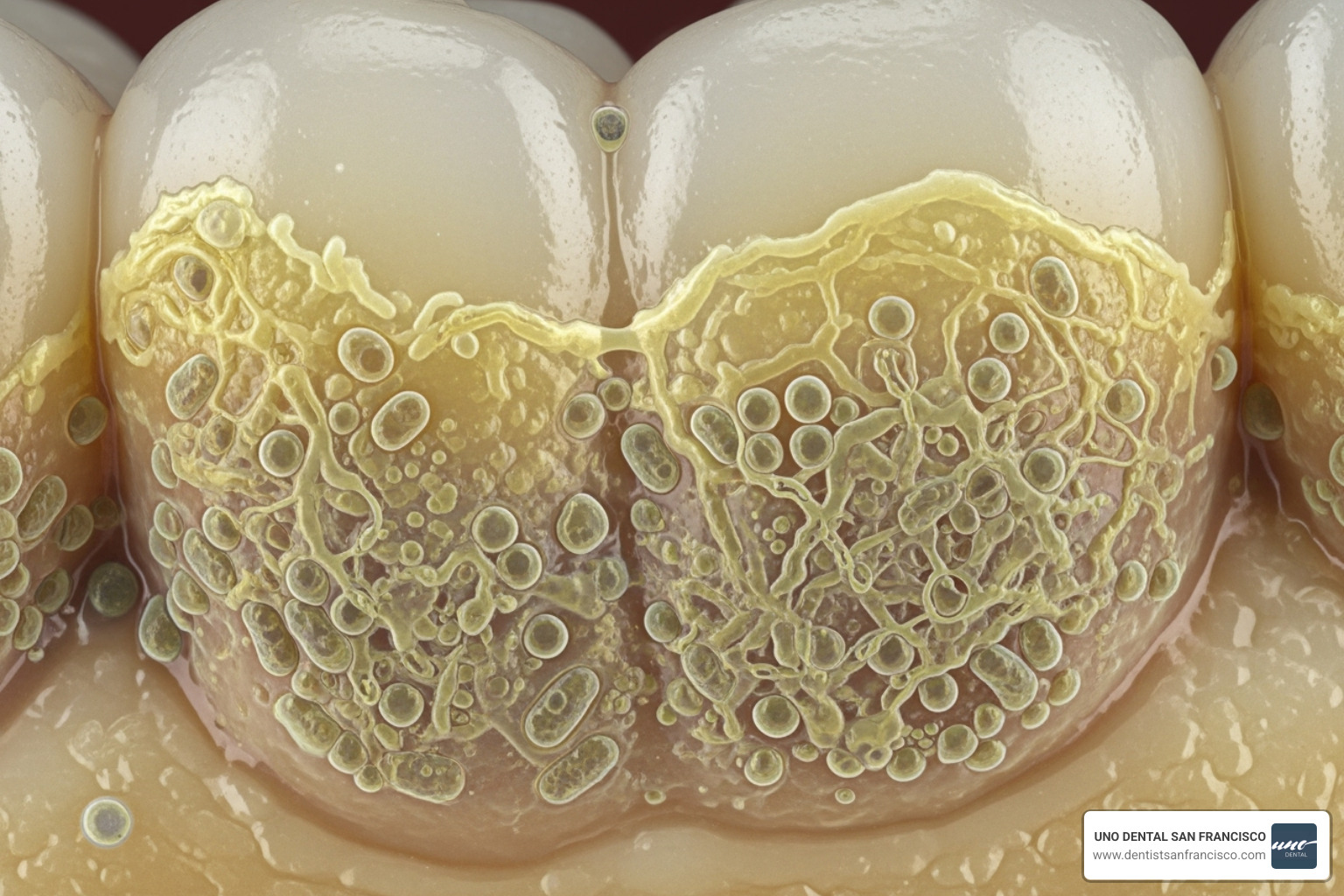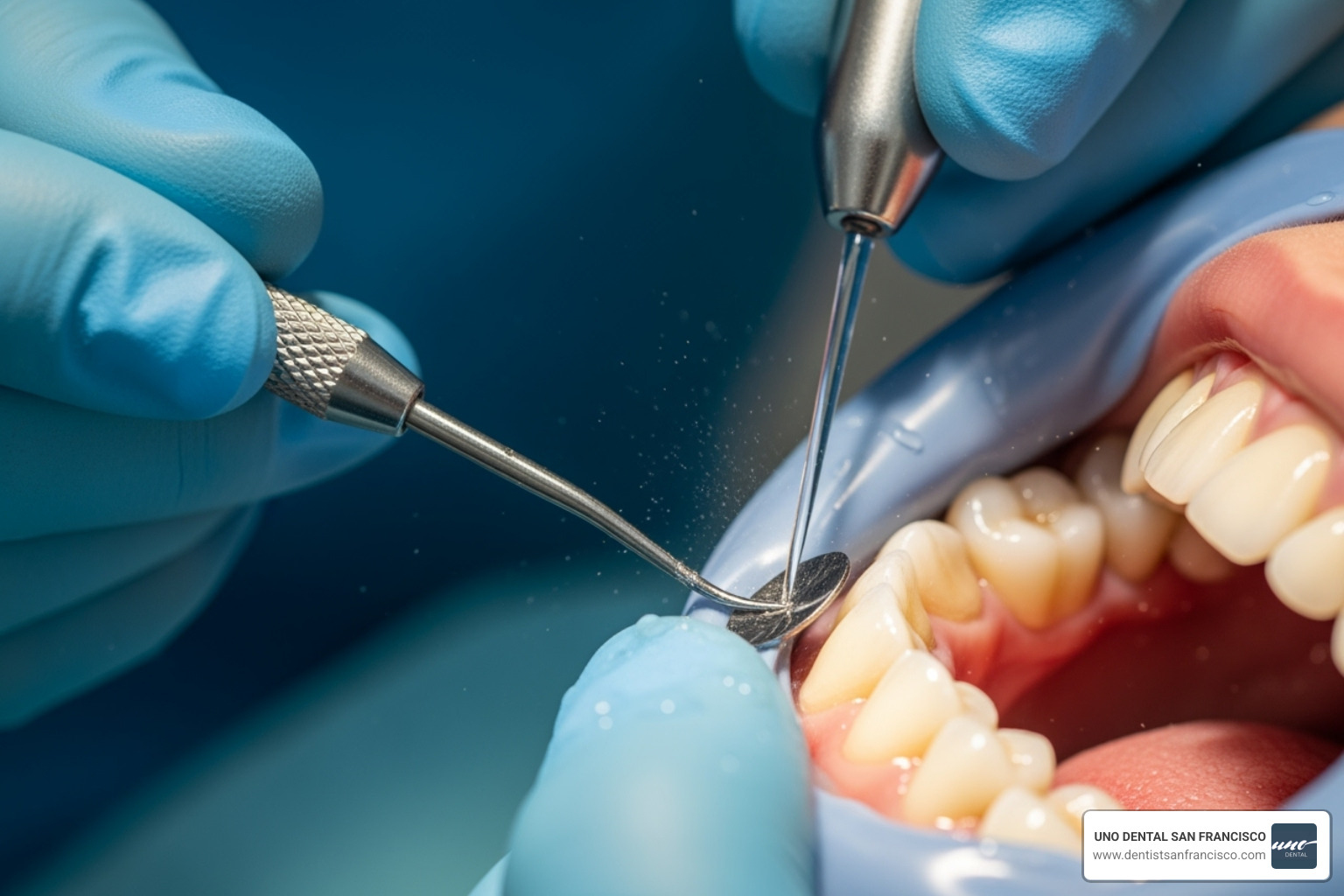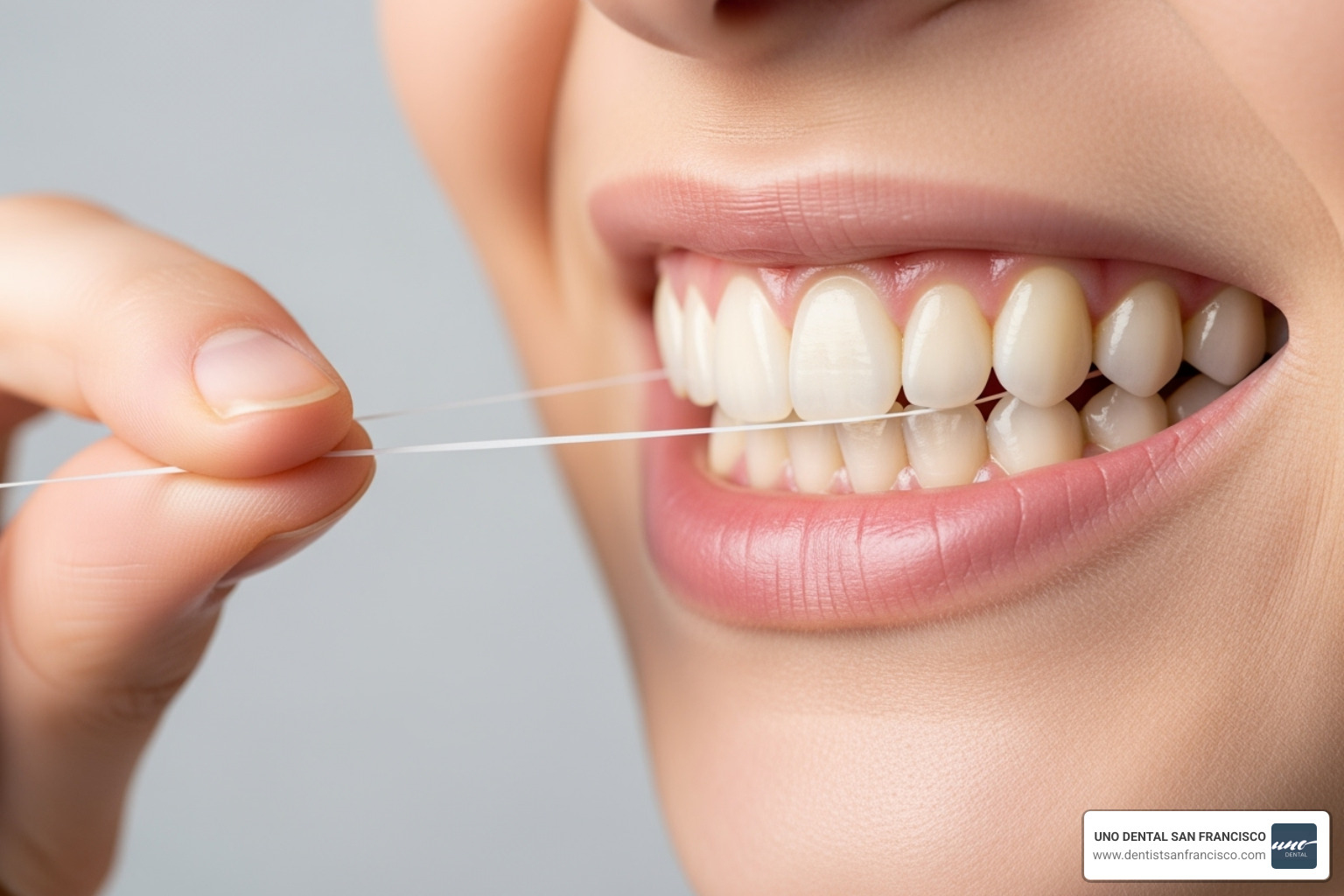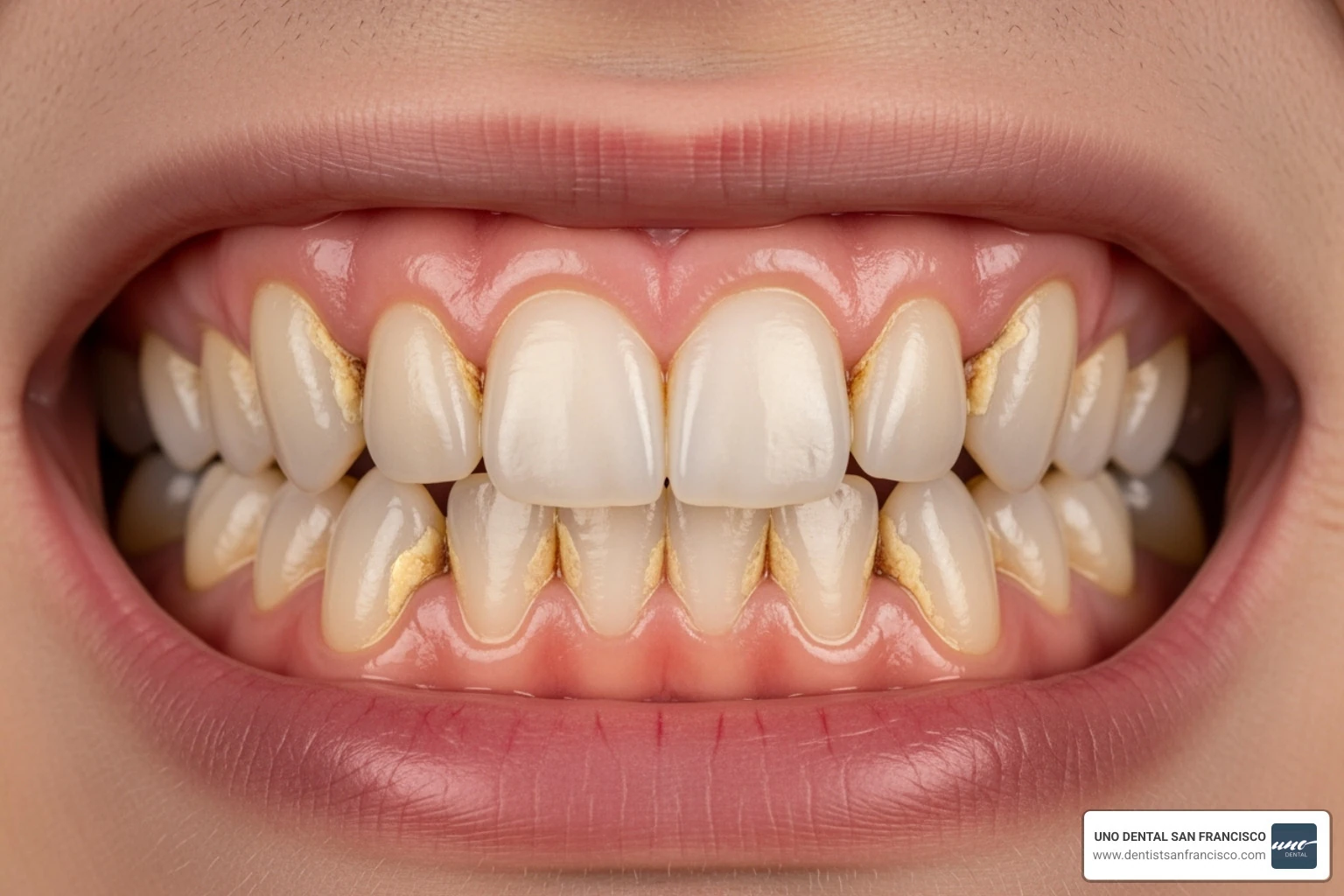
Understanding Bad Breath Gingivitis: What's Happening in Your Mouth
Bad breath gingivitis is a condition where inflamed gums, caused by plaque buildup, produce a persistent, unpleasant mouth odor. If you've noticed a lingering bad taste or smell that mints can't fix, it might be a sign of this common but reversible condition.
Quick Facts About Bad Breath Gingivitis:
- What it is: Inflammation of the gums (gingivitis) that releases foul-smelling sulfur compounds.
- Main cause: Bacteria in plaque breaking down proteins and releasing odorous gases.
- Key symptoms: Red, swollen, bleeding gums accompanied by persistent bad breath.
- Good news: Gingivitis is the only reversible stage of gum disease when treated early.
- Prevalence: Up to 80% of patients with gum disease experience halitosis.
When bacteria accumulate along your gum line, they break down proteins and release volatile sulfur compounds—the same chemicals that give rotten eggs their terrible smell. This creates a distinctive odor known as "perio-breath" that mouthwash only masks temporarily.
Almost half of adults over 30 show signs of gum disease, and most cases of halitosis relate to gingivitis or periodontitis. The silver lining is that gingivitis can be completely reversed with proper care.
As Mohammad Aghiad Kandar, DDS, I've helped countless patients at UNO DENTAL SAN FRANCISCO address bad breath gingivitis with comprehensive treatment plans. My 15 years of experience have shown me that understanding the link between gum health and bad breath is the first step toward lasting oral wellness.
The Science Behind "Perio-Breath": How Gingivitis Causes Halitosis
When bad breath lingers day after day, it's often a sign of something more than just the food you ate. This persistent odor, known as bad breath gingivitis, signals an underlying issue with your gum health.
Gingivitis is the earliest stage of gum disease, marked by gum inflammation, irritation, and swelling. This environment is a breeding ground for odor-producing bacteria that break down proteins in your mouth, releasing Volatile Sulfur Compounds (VSCs). These are the same chemicals responsible for the smell of rotten eggs and are the source of the foul odor associated with gum disease.
The Critical Role of Plaque and Bacteria
It all begins with plaque—a sticky, colorless film of bacteria that constantly forms on your teeth. If not removed daily, plaque hardens into tartar (calculus), a stubborn substance that can only be removed by a dental professional. Tartar irritates the gums and creates a rough surface that attracts more bacteria.
Many of these bacteria are anaerobic, meaning they thrive in low-oxygen areas like the space beneath your gumline. As they multiply, they release toxins that trigger an inflammatory response, causing the redness, swelling, and bleeding characteristic of gingivitis. This combination of bacterial activity and inflammation is why gingivitis and bad breath are so closely linked.
Understanding the Odor of Bad Breath Gingivitis
The smell of gum disease, or "perio-breath," is distinct from temporary bad breath. It has a persistent quality that mints and mouthwash can't eliminate. Patients often describe it as a sulfur smell (like rotten eggs) or a deep infection odor. In advanced cases, it can even smell like rotting tissue as bacteria break down oral tissues.
This odor is a clear warning sign from your body. Unlike bad breath from food or a dry mouth, persistent halitosis accompanied by bleeding or swollen gums strongly indicates underlying gum disease. At UNO DENTAL, we help patients recognize these signs to address gum disease before it worsens.
Is It Gingivitis or Something More? Warning Signs and Diagnosis
Knowing whether you have simple gum irritation or a more serious condition is key to effective treatment. While bad breath gingivitis is the earliest and most treatable stage of gum disease, ignoring the signs allows it to progress. Recognizing the red flags early is crucial.
Gingivitis is a warning sign, while periodontitis indicates that irreversible damage has begun. Here's how they compare:
| Symptom | Gingivitis | Periodontitis (Advanced Gum Disease) |
|---|---|---|
| Bleeding Gums | Common, especially when brushing or flossing | Common, often spontaneous or with light touch |
| Gum Color | Red, swollen, puffy, bright or dark red | Bright red, purplish, or bluish-red |
| Gum Sensitivity | Tender to touch, often painless overall | Painful, especially when chewing |
| Gum Recession | May be present, but often subtle | Significant, teeth may appear longer |
| Bad Breath/Taste | Persistent bad breath or metallic taste | Persistent, strong "perio-breath" (deep infection, sulfur, rotting) |
| Pockets | Shallow pockets between gums and teeth | Deep periodontal pockets, accumulating bacteria and debris |
| Tooth Mobility | None | Loose or shifting teeth |
| Bone Loss | None | Present, visible on X-rays, irreversible |
| Reversibility | Yes, fully reversible with treatment | No, irreversible damage; manageable but not curable |
Early Warning Signs of Bad Breath and Gingivitis
The early stages of bad breath gingivitis present subtle but important clues that should not be ignored:
- Gums that bleed easily: Seeing pink in the sink when you brush or floss is not normal. Gums that bleed are a key sign of inflammation.
- Red, swollen, or tender gums: Healthy gums are firm and coral-pink. Gingivitis causes them to become puffy, red, and sore to the touch.
- Persistent bad breath or a foul taste: This isn't temporary breath odor from food. It's a lingering smell or taste caused by bacterial byproducts that brushing alone can't eliminate.
- Receding gums: Even subtle changes that make your teeth look longer warrant attention.
Since gingivitis is often painless, it's easy to delay a dental visit. However, early intervention is critical.
Gingivitis vs. Periodontitis: When to See a Dentist
The difference between gingivitis and periodontitis is the difference between a reversible condition and a lifelong management challenge.
Gingivitis is inflammation limited to the gum tissue. It causes redness and swelling but has not yet damaged the bone and connective tissues that support your teeth. This is why it's completely reversible with professional cleaning and good home care.
Periodontitis occurs when the inflammation spreads deeper, destroying the bone and tissues that anchor your teeth. This damage is irreversible. Deep pockets form between the gums and teeth, trapping more bacteria and leading to bone loss. At this stage, the goal shifts from a cure to managing the disease to prevent tooth loss.
If you notice any warning signs, especially persistent bad breath or bleeding gums, schedule an appointment at UNO DENTAL. A professional diagnosis using tools like periodontal probing and X-rays is the only way to know for sure and create the right treatment plan. Don't wait for pain—by then, permanent damage may have already occurred.
Your Action Plan for Reversing Bad Breath Gingivitis
The great news about bad breath gingivitis is that it's completely reversible with early treatment. At UNO DENTAL, our holistic approach addresses both the symptoms and root causes of gum inflammation to restore your oral health and confidence.
Reversing gingivitis requires a partnership: professional treatments to reset your oral health and consistent home care to maintain the results. This combined strategy is the gold standard for success.
Professional Dental Treatments
At UNO DENTAL, we use high-tech diagnostics to create a personalized treatment plan. Our goal is to create a clean, healthy environment where your gums can heal.
- Dental Deep Cleaning: Our hygienists remove all plaque and tartar from above and below the gum line, eliminating the bacterial colonies causing inflammation and odor.
- Scaling and Root Planing: For deeper buildup, this intensive cleaning removes tartar from below the gum line and smooths the tooth roots. This helps remove bacterial toxins and prevents plaque from reattaching.
- Laser Therapy: We incorporate dental lasers to precisely target and remove infected tissue, which promotes faster, more comfortable healing.
- Antimicrobial Rinses: We may prescribe specialized rinses to control bacteria and support the healing process between visits.
At-Home Prevention and Care
Professional treatment is the first step, but daily home care is what ensures gingivitis stays away for good.
- Brush Twice Daily: Use a soft-bristled brush and fluoride toothpaste for two minutes, focusing on the gum line.
- Floss Daily: This is non-negotiable for removing bacteria and food particles from between teeth and under the gums, where a toothbrush can't reach.
- Clean Your Tongue: Use a tongue scraper to remove the bacterial film that contributes to bad breath.
- Use Antiseptic Mouthwash: An alcohol-free formula can help control bacteria without causing dry mouth, which can worsen bad breath.
- Eat a Healthy Diet and Stay Hydrated: Limit sugar and eat crunchy fruits and vegetables. Drinking plenty of water helps wash away bacteria and food debris.
These simple habits are powerful tools in preventing the return of bad breath gingivitis.
The Whole-Body Impact of Untreated Gum Disease
What happens in your mouth doesn't stay in your mouth. At UNO DENTAL, we emphasize a holistic view of health because untreated bad breath gingivitis can affect your entire body. Bacteria and inflammation from your gums can enter the bloodstream, contributing to serious systemic health problems.
Your mouth is a gateway to the rest of your body. An infection there can become a source of systemic inflammation, stressing your body and contributing to issues you might not associate with oral health.
Beyond the Mouth: Systemic Health Risks
Extensive research links gum disease to a range of serious health conditions:
- Cardiovascular Events: People with gum disease have a significantly higher risk of heart attack and stroke, as oral bacteria can contribute to arterial plaque.
- Diabetes Complications: Gum disease and diabetes have a two-way relationship. Diabetes increases the risk for gum disease, and severe gum disease can make it harder to control blood sugar.
- Respiratory Disease: Inhaling bacteria from infected gums can lead to pneumonia and other respiratory issues, especially in vulnerable individuals.
- Other Health Concerns: Studies have also linked periodontitis to an increased risk of stroke, certain cancers, and a weakened immune system from the constant fight against chronic inflammation.
Long-Term Consequences for Your Oral Health
If left untreated, bad breath gingivitis will progress, leading to devastating and irreversible consequences for your mouth:
- Advanced Periodontitis: The disease advances to destroy the bone and tissues supporting your teeth.
- Tooth Loss: As the supporting structures deteriorate, teeth become loose and eventually fall out. This is a leading, yet preventable, cause of tooth loss in adults.
- Jawbone Deterioration: Chronic infection and tooth loss can lead to the loss of jawbone, altering facial structure and complicating future dental work.
- Shifting Teeth and Abscesses: Teeth may move or drift, and painful abscesses can form.
- Need for Extensive Surgery: Advanced cases may require invasive procedures like bone or tissue grafts to manage the damage.
The progression from reversible gingivitis to these severe outcomes is predictable if left untreated. Early intervention is the best way to protect both your oral and overall health.
Frequently Asked Questions About Bad Breath and Gingivitis
At UNO DENTAL, we frequently address patient concerns about persistent bad breath and its connection to gum health. Here are answers to some common questions.
Is bad breath always a sign of gum disease?
Not always, but persistent bad breath is a primary symptom. While other factors like dry mouth, certain foods, tonsil stones, or systemic conditions (like diabetes or acid reflux) can cause bad breath, the vast majority of cases stem from oral issues. If your bad breath is constant and accompanied by red, swollen, or bleeding gums, bad breath gingivitis is the most likely cause.
Can gingivitis and the bad breath it causes be completely cured?
Yes, absolutely. Gingivitis is the only stage of gum disease that is fully reversible. A cure requires a two-part approach: a professional cleaning at our office to remove all plaque and tartar, followed by consistent daily home care (brushing, flossing, and tongue cleaning). Once the bacterial irritants are removed and kept at bay, the inflammation heals, and the bad breath resolves. While gingivitis is curable, periodontitis (the advanced stage) is not, but it can be managed to prevent further damage.
How quickly can I get rid of bad breath from gingivitis?
Most patients experience immediately fresher breath after their professional cleaning, as a large volume of odor-causing bacteria is removed at once. With consistent daily home care, you will see continued improvement over the next few days and weeks as the gum inflammation subsides. Full healing of the gums and complete resolution of bad breath typically takes several weeks, depending on the initial severity of the gingivitis and your commitment to your oral hygiene routine.
Take Control of Your Oral Health in San Francisco
We've covered how bad breath gingivitis develops, its warning signs, and its potential impact on your overall health. The most important takeaway is that gingivitis is completely reversible with early and proper care. You have the power to stop gum disease before it causes irreversible damage.
At UNO DENTAL SAN FRANCISCO, we help patients struggling with persistent bad breath regain their health and confidence. Our practice is built on a holistic, patient-centered approach that uses advanced technology to address the root cause of your concerns. We provide comprehensive evaluations and create personalized treatment plans—from meticulous deep cleanings and laser therapy to custom home care guidance.
Don't let minor symptoms become major problems. Proactive care is the best strategy for maintaining oral health and preventing the progression of gum disease. If you've noticed bleeding gums, persistent bad breath, or other warning signs, now is the time to act.
We invite you to experience the UNO DENTAL difference. Schedule your periodontal consultation today and take the first step toward fresher breath, healthier gums, and lasting oral wellness. Your smile and your health will thank you.
Manual review completed by Mohammad Aghiad Kandar, DDS.
